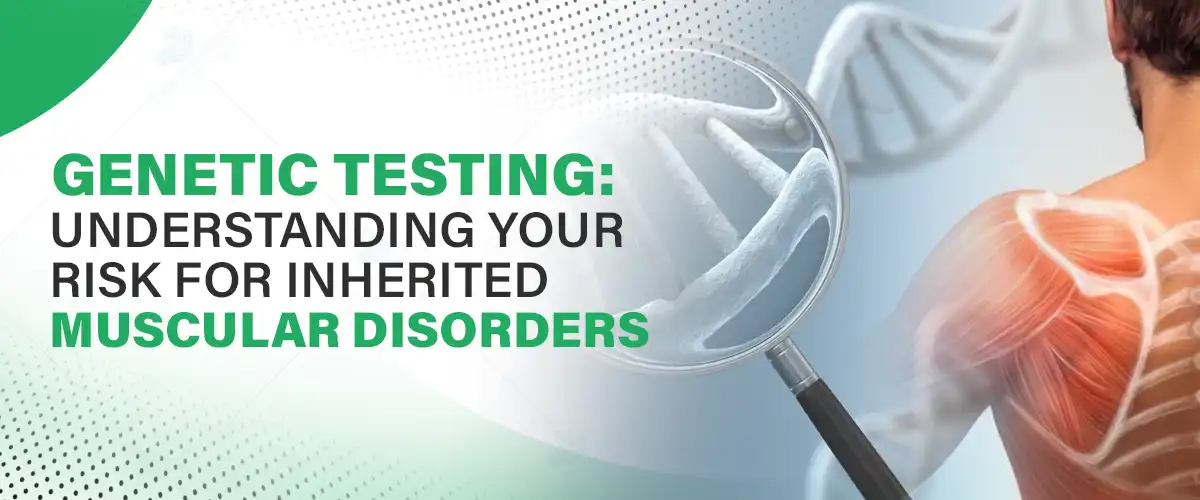
Subscribe to our

Genetic testing plays a crucial role in diagnosing inherited muscular disorders, enabling early detection and timely intervention. These tests help identify specific gene mutations responsible for various muscular conditions, including muscular dystrophies. Early diagnosis allows for better symptom management, access to treatment options, and informed decision-making for affected individuals and their families.
By undergoing muscular dystrophy genetic testing, individuals can determine their risk levels and explore preventive or therapeutic measures. Understanding the genetic basis of these disorders is essential for improving quality of life and accessing specialized care.
Contact Felix Hospitals today at +91 9667064100 to learn more about our specialized neuromuscular care.
Inherited muscular disorders refer to a group of genetic conditions that cause progressive weakness and degeneration of muscle tissues. These disorders result from mutations in specific genes responsible for muscle function. Some common types include:
Genetic mutations play a significant role in the development of inherited muscular disorders. Muscular dystrophy genetic testing helps identify these mutations and confirm diagnoses. The types of genetic tests available include:
The testing process typically involves a simple blood or saliva sample collection, followed by laboratory analysis to detect genetic abnormalities.
Muscular dystrophy genetic testing is recommended for:
Genetic testing offers numerous advantages, including:
While muscular dystrophy genetic testing is highly beneficial, it also has certain limitations:
Once the test results are available, they may be:
Following the results, individuals may require further medical evaluation, lifestyle modifications, and ongoing monitoring. Genetic counseling plays a crucial role in helping patients understand their results and make informed healthcare decisions.
Felix Hospitals is home to a team of highly skilled neurologists specializing in the diagnosis and treatment of inherited muscular disorders. Our experts are committed to providing comprehensive care, helping patients manage symptoms effectively, and improving their quality of life.
With their expertise and dedication to patient well-being, our team at Felix Hospitals ensures the highest standard of care for individuals affected by inherited muscular disorders.
Take Control of Your Health Today! Early detection can make a difference! Book an appointment now!
Genetic testing is a powerful tool for identifying inherited muscular disorders and understanding individual risks. Early detection through muscular dystrophy genetic testing can lead to better treatment options, proactive health management, and informed family planning.
Consulting a healthcare professional for genetic evaluation is an important step toward gaining clarity about one’s condition and securing the best possible care. If you or a loved one have concerns about inherited muscular disorders, consider reaching out for expert guidance and genetic assessment.
Q- How accurate is genetic testing for inherited muscular disorders?
Ans- Genetic tests are highly accurate in detecting known mutations associated with muscular dystrophies and other neuromuscular disorders. However, some rare or newly discovered mutations may not be identified with current testing methods.
Q- Can genetic testing predict the severity of a muscular disorder?
Ans- While genetic testing can confirm the presence of a mutation, predicting the exact severity or progression of the disorder is challenging. Other factors, such as lifestyle and secondary genetic influences, can affect disease manifestation.
Q- Is genetic testing necessary if I already have a clinical diagnosis of a muscular disorder?
Ans- Yes, genetic confirmation helps determine the specific mutation responsible for the condition, which can guide treatment options, family planning, and eligibility for clinical trials.
Q- What are the risks or side effects of undergoing genetic testing?
Ans- The testing process itself is non-invasive, usually requiring a blood or saliva sample. The primary concerns are psychological stress from the results and potential privacy implications regarding insurance or employment.
Q- Can a negative genetic test result completely rule out an inherited muscular disorder?
Ans- Not necessarily. Some muscular disorders may have unidentified or complex genetic causes that current tests cannot detect. Additional medical evaluations may be required.
Q- How long does it take to receive genetic testing results?
Ans- The turnaround time varies based on the type of test conducted. Single-gene tests may take a few weeks, while whole-genome sequencing (WGS) can take several months.
Q- Can genetic testing help in finding a cure or treatment for my condition?
Ans- While genetic testing itself does not provide a cure, it helps in identifying the best treatment options, participation in research trials, and eligibility for emerging therapies targeting specific genetic mutations.